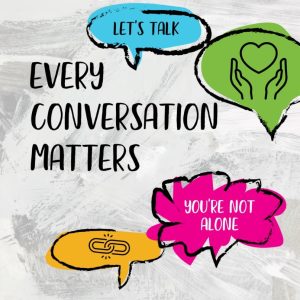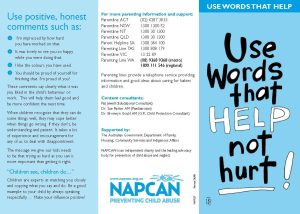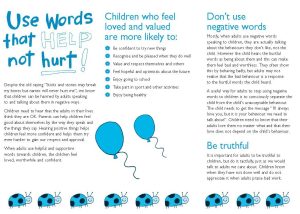
‘Every conversation matters’ is this year’s National Child Protection Week’s (1–7 September) annual theme. Conversations are powerful tools to keep children and young people safe and well. Conversations can help us understand issues, craft solutions, value community knowledge, and build the brains and social connections of children and young people.
Conversations between
… children and their care givers matter (from the very earliest days)
… children and their peers matter
… families with teachers, doctors, and other professionals matter
… friends or neighbours matter
… decision-makers and the communities they serve matter
And, of course, conversations in the public realm and media matter …
In today’s newsletter I would like to focus on the significant impact that our conversations (including our choice of words, our attitude, as well as our tone of voice) as parents have on our children. Children internalize their parents’ voices in ways that significantly impact their emotional and psychological development.
This internalization involves absorbing and integrating the messages, tones and attitudes expressed by their parents, which can shape their self-perception and worldview. Here is how this process typically works:
1. Formation of Self-Esteem:
Children often see themselves through their parents’ eyes. Positive reinforcement can build self-esteem, while criticism or negative feedback can lead to feelings of inadequacy or self-doubt. For example, a child who hears constant criticism may come to believe they are worthless or incapable.
2. Emotional Regulation:
Parents’ vocal tones and patterns of communication help children learn how to manage and express their own emotions. Consistent emotional support helps children develop healthy coping strategies, while a harsh or dismissive tone can lead to difficulties in managing emotions and forming secure attachments.
3. Internal Dialogue:
Children often internalize the messages they hear from their parents and adopt these messages as their own inner voice. If a parent frequently expresses disappointment or anger, a child might develop a critical inner voice that echoes these sentiments, leading to self-criticism, depression and anxiety.
4. Beliefs and Expectations:
The expectations and beliefs parents communicate, whether explicitly or implicitly, become internalized by children. For example, if parents repeatedly express high expectations, a child may internalize the belief that they must always achieve perfection in order to be valued or worthy.
5. Behavioural Patterns:
Children learn how to interact with others based on their parents’ communication styles. If parents use effective and empathetic communication, children are more likely to develop similar positive interactions. On the other hand, exposure to aggressive or dismissive communication can lead to difficulties in forming healthy relationships.
6. Modelling Behaviour:
Children mimic their parents’ behaviour and language. If parents use certain words, tones, or styles of communication, children may adopt these same patterns in their interactions with others, impacting how they express themselves and handle conflicts.
To mitigate negative effects, it is important for parents to be mindful of their communication and strive to model positive, respectful and supportive interactions. Providing constructive feedback, showing empathy, and expressing unconditional love can help children develop a positive self-image and healthy emotional resilience. If the internalized messages are harmful, seeking support from a therapist or counsellor can be beneficial for addressing and reshaping these internalized beliefs.
For over 30 years, NAPCAN has been running the annual National Child Protection Week campaign which looks at what works to keep children safe and supported, what children are telling us, what families are telling us, what the evidence is telling us, and how to translate this knowledge into action.
Each campaign builds on the strengths of previous years and has evolved to provide support to communities to act on the core message, “protecting children is everyone’s business.” Visit the NAPCAN website http://www.napcan.org.au/ for more information, support and resources. I have attached a NAPCAN flyer, “Use words that help, not hurt,” for some practical ideas on helping our children feel good about themselves and develop a positive self-image.


If you feel you need support in implementing some of these strategies, consider ringing the VIC Parentline on 13 22 89 which is a telephone service providing information and good ideas about caring for children.
Until next time,
Marisa Smit
CGS Psychologist

 903
903












